Camping has been a crowd pleaser amongst our family for decades, from our days of squeezing 5 people into a 4-man tent in the Drakensberg mountains, to traveling from Cape Town to Kenya with a 4×4 off-road trailer.
As the kids got older and then busier with university, our parents started traveling alone more and more often, and were curious about adding slightly more luxury into their trips. In 2020 they made the leap of buying their first motorhome and since then, have never looked back.
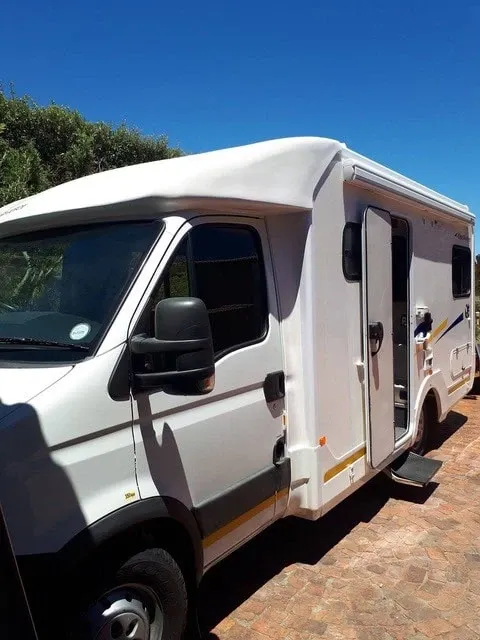
The First Motorhome – a second hand Iveco Discovery 4.
What exactly is a motorhome?
While most people would use the terms motorhome and campervan interchangeably, there is a slight but important difference found in the body of the vehicle.
A campervan is a smaller load vehicle with a sliding door and generally contains limited amenities.
A motorhome is a larger chassis cab, fitted with a ‘house’ on the back. Your budget, length of travel and desire for space will be the deciding factors in which you go for, but whether it’s a campervan or motorhome you end up driving, the van life will always keep you coming back for more!
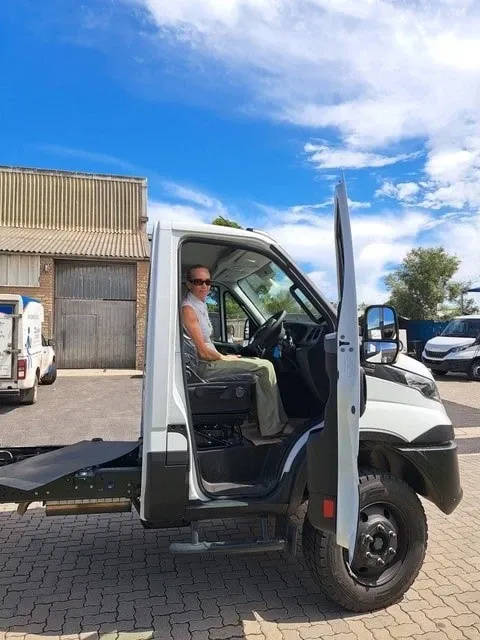
Do you buy new, second hand, or build your own?
At the end of the day, your motorhome or campervan is a great asset, holding its value exceptionally well if properly cared for. While there’s no right or wrong answer for your first van, our initial purchase was a second hand vehicle (an Iveco Discovery 4) which gave an easy taste of life on the road.
Each traveler is unique, so here is a helpful list of pros and cons to help you find what suits you best:
1) Buying Second Hand:
A very cost-effective way to enter the market, buying second hand is perfect for those wanting to test out van life. It is quite a commitment to purchase a home on wheels, and this option opens the market to a broader set of people. In saying that, second hand vehicles have limited warranties and a higher wear and tear – so be careful when looking at these options.
“Our second hand purchase came with some pitfalls – we had bought it with high mileage (150,000km+), so it was mechanically risky– and the clutch and assembly blew while going up Piekenierskloof Pass on the way to Clanwilliam” – Thomas Altmann.
If you do choose the second hand option, we recommend going for a strong brand such as Iveco, Mercedes, Fiat, or Volkswagen, whose builds are a commercial chassis with motors that should be good for at least 250,000km (depending on how it is looked after).
Top tip – if you’re new to van life, buy second hand and tweak it to your liking – the Internet is full of great ideas.
2) Owner Build:
This option really lets you ‘get to know’ your motorhome and design it exactly how you’d like – giving flexibility and creativity to the owner. It ends up being quite affordable this way, but one needs to be a quite the handyman and a problem solver throughout the process.
There are actually plenty of Facebook groups filled with like-minded people, that have somehow gone through the same issue as you, whether its replacing a fridge, deciding on lighting fixtures, or anything in between. It’s very exciting to work through the various layout choices, and decide on each and every item and appliance that goes inside. We advise looking at international suppliers as they offer almost unlimited options when it comes to gadgets and gismos.
Top tip – if you’re a practical, hands-on person, this is the best choice for you.
3) Buying New:
Obviously this is the highest entry cost into the market, but if you have the budget, it eliminates any worry that could accompany a second-hand purchase. It comes with everything you need, is tried and tested by the manufacturer, and has a warranty in the case that something bad occurs.
While there are a wide selection of sizes and variants of new motorhomes, there is less flexibility in purchasing a new model, with regards to exact interior design.
Top tip – if you’re able to buy new, try and get involved in the design process for maximum return.
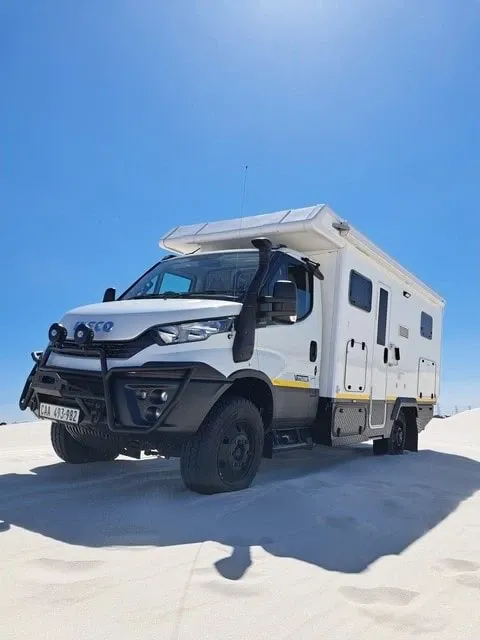
The New Iveco Discoverer Extreme 4×4 Motorhome.
Now we’ve covered the ways in which you can acquire your motorhome, let’s help you avoid making some of the mistakes we did, by providing an insight into what we learnt along the way:
1. When going off-grid, you can never have enough battery power, so make sure you have a solar charging system as a back up. Here’s an example of the panels on our Fiat Ducato, conveniently located across a section of the roof.

Solar Panels on the Roof of the Fiat Ducato.
2. Add a simple water filtration system, in case you end up somewhere that the water looks a little dodgy. Don’t risk getting sick (we’ve been there and done that – it’s not fun trying to find medical care in the middle of the bush).
3. Don’t skimp on tyre quality – good tyres make gravel road driving much more enjoyable.
4. Fluctuate your tyre pressures according to the road conditions. Increasing tyre pressure from gravel to tar ensures tyre stability, and avoids any increase in braking distance or heat build-up. Lowering tyre pressure on gravel and especially on sand increases your grip, and reduces your chance of getting stuck.
5. Make sure you have a comfortable mattress (you’d think this goes without saying, but we had to make a few changes before we could sleep soundly throughout the night).
6. Consider a bike rack on the back of your van. Bicycles or electric bicycles are a great addition to your van, allowing you to explore around your campsite, maybe visiting near towns, without having to pack up your entire house on wheels.
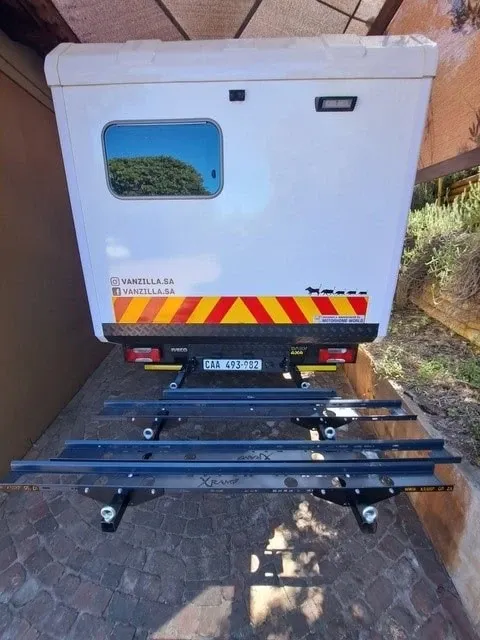
An example bike rack on the back of our motorbike.
7. Have separate fridges for food and drinks. This allows for maximum battery life and minimal temperature loss while accessing your goods. An upright fridge / freezer is best for food, and adding a top-access fridge for your drinks will make life a lot easier.
8. Buy very strong plastic or ideally solid wood chocks to adjust parking height – weaker plastics can crack under the weight of your van.
9. A main window that can open fully – this creates the illusion of much greater space inside and also gives you a great view of the surrounding landscape.
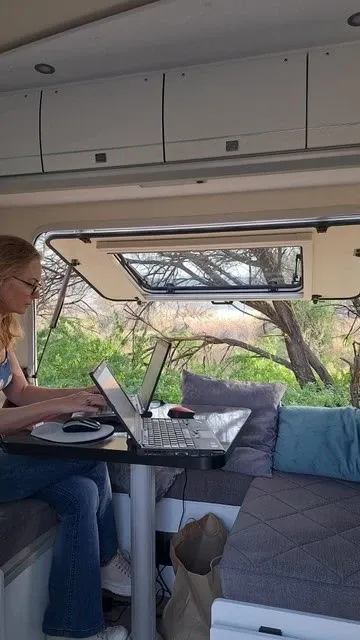
10. An awning – it’s worth it’s weight in gold – it extends your house on wheels to include a front porch as well.
11. If you don’t have a full inside bathroom, install a porta potty of sorts for those night-time number 1’s – it’s better than facing unwanted animal encounters on the way to the loo, especially if you’re really out in the wild.
12. You can never have enough water onboard – you use it for cooking, cleaning, washing, drinking and showering – it runs out faster than you’d think so ensure the tank is always topped up.
~~~~
Wondering what’s out there on the market?
Here’s a quick summary of our Van History:
1) Our first purchase was a second hand Iveco Discovery 4 with 150,000kms on the clock.

The First Motorhome – a second hand Iveco Discovery 4.

The Iveco Discovery 4, our first motorhome, pictured from the side.
As this was second hand, it was acquired for R470k, and only cost around R10k to spruce up.
2) Our second one was a new (empty) Fiat Ducato panel van which we kitted out ourselves (with the help of specialised trades like 12v electricians)
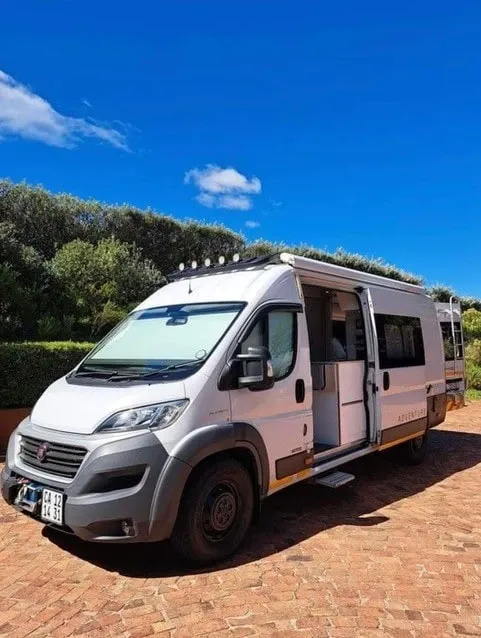
The Fiat Ducato – our second motorhome.
The new Fiat Ducato cost R520k as a panel van, then to fully kit it out was another R140k complete.
3) Our third (and current) van is the Iveco Discoverer 4×4 Extreme – built by Motorhome World which we take out almost every weekend – our pride and joy and our home away from home.
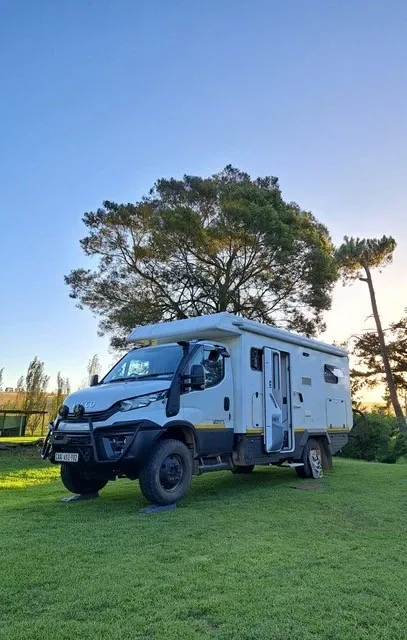
The Iveco Discoverer 4×4 Extreme – our third and current motorhome.
The Iveco Discoverer 4×4 Extreme was bought new, with a full custom build to a pre-negotiated specification. All in this would cost you R2.8million.
~~~~
It’s worth noting that Motorhomes often evolve with time.
As you travel more, you’ll discover things you want to tweak or outright improve on. Whether it’s upgrading the mattress, adding extra storage, or fine-tuning the plumbing; van life is an ongoing process of learning what works best for you.
~~~~
(This article was written by Hannah Altmann, a Guest Writer for The Africa Rally; to get in touch about joining our team of Guest Writers, or taking part in one of our events, please email the HQ Team on info@africarally.com)
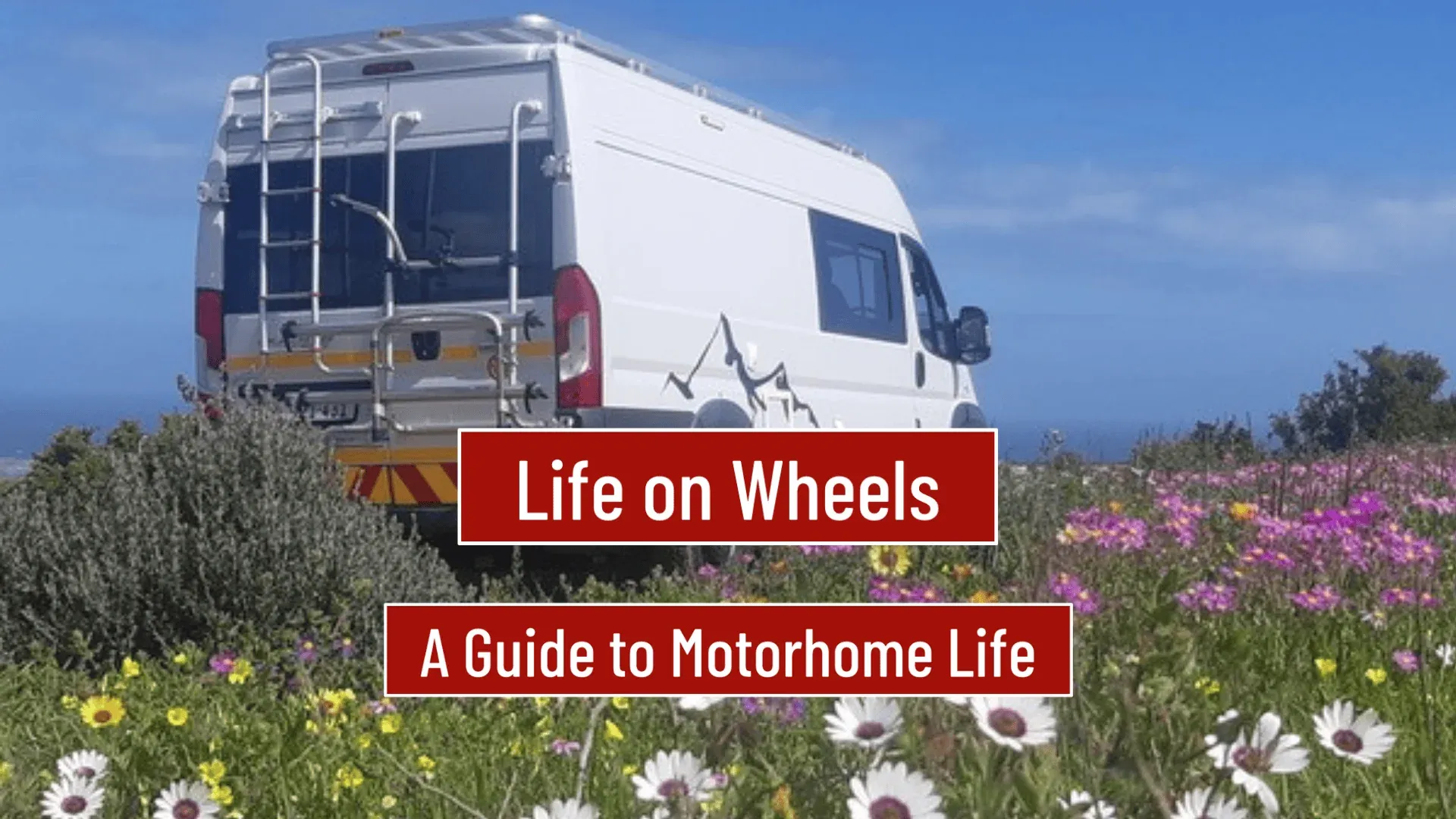



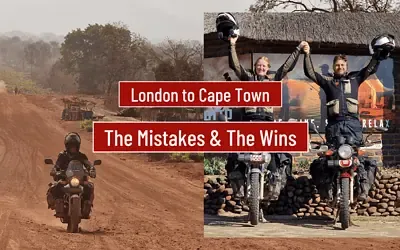
0 Comments